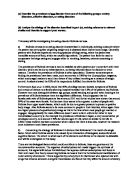The fact that concordance rates for MZ twins in Nurnberger & Gershon (1982) is significantly below 100%, however, indicates that genetic factors do not give us the whole picture. Therefore, despite higher concordance rates in MZ twins, it is clear we cannot rule out the influence of the environment. It is also worth noting that the data of Nurnberg & Gershon (1982) are correlational, and therefore do not show that the genetic factors cause depression. Capsi et al. (2003) for instance suggest that genetic factors could moderate responses to environmental factors. This is best explained by the example that long term stress may result in depression in people who are genetically predisposed to be more vulnerable to its effects
A different look at the role of genetic factors is provided by research into evolutionary factors. Evolutionary psychologists suggest that depression may be a previously adaptive behavior left-over by genome lag that no longer serves its adaptive purpose so clearly today. This principle is clearly demonstrated by the Social Competition Hypothesis (Price et al., 1994), which suggests that depression was an adaptive response of a person who loses a conflict in a group. Depression would force the loser to: 1) stop competing for food, 2) accept defeat, 3) Signal their submission to the winner (mitigating further conflict and self-harm). This helps keeps the individual alive and capable of reproducing. While this may have mitigated conflict over physical resources in the past, it seems to also be triggered today by losses of emotional resources – making it maladaptive in the modern world. This research is very speculative however. It is difficult to find evidence to support it as its claims are not easily tested scientifically; thus, it remains a hypothesis.
Biochemical factors, however, have a stronger body of supporting research. The most prominent hypothesis in this field is the Monoamine Hypothesis, which proposes that low levels of monoamines, such as serotonin, at the synapse are responsible for depression. Supporting this, Delgado and Moreno (2000) and Rampello et al. (2000) found abnormal levels of noradrenaline and serotonin in patients suffering from major depression. It is clear, however, that explaining depression simply in terms of low levels of monoamines would be reductionist. Further, the research is open to bidirectional ambiguity: it is not clear whether neurotransmitters caused depression or whether depression influenced the production of neurotransmitters. Burns (2003) highlights the fact that since it is not possible to measure brain serotonin levels in living humans, therefore it is not possible to directly test the theory. It must be recognized, however, that the use of antidepressants which increase the concentration of monoamines in synapses, has been very effective in alleviating the symptoms of depression.
Recent research has also elucidated the role of other biochemicals, such as the hormone: cortisol. Patients with major depressive disorder have been found to have high levels of hormone cortisol, indicating a link between long term stress and depression. This is further supported by a high prevalence of depression in people with Cushing’s syndrome (a disease which results in excessive production of cortisol), as well as the effective mediation of depression in these patients through cortisol level-stabilizing drugs. High levels of stress hormones could damage the hippocampus, which provides a possible mechanism by which cortisol causes depression. The link between the stress hormone and the disease is not yet clearly understood, however. Fernald and Gunner (2008), for example, found instead, that low levels of cortisol were related to depression and poverty. After surveying 639 Mexican mothers and their children, they found that children of depressed mothers living in extreme poverty produced less cortisol. They suggested these low levels of cortisol, indicated that the stress system is worn out, leaving children susceptible not only to depression but also to other diseases.
In conclusion, it is clear that biological factors seem to play an important role in the development of depression. Clearly, however, explaining depression’s etiology in terms of simply biological factors would be significantly reductionist – especially in light of the relationship evident in the research between biochemical/genetic factors and environmental factors such as stress. Understanding the etiology of this disorder is important because of its high prevalence and significant impact on the individual and society. To most comprehensively approach this understanding, it is important to take a holistic, ‘biopsychosocial’ approach.








